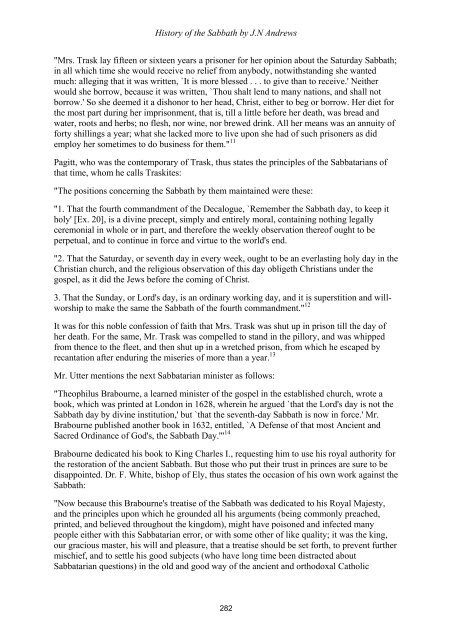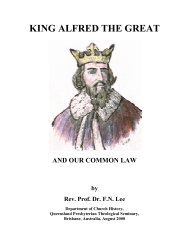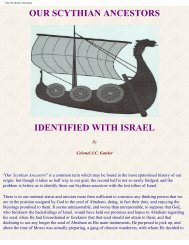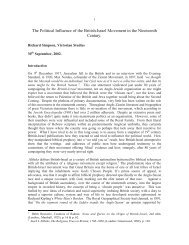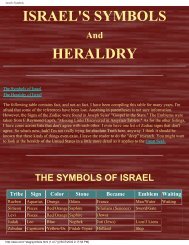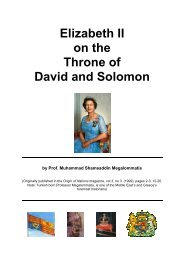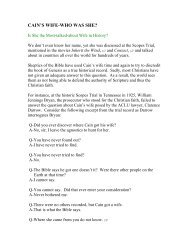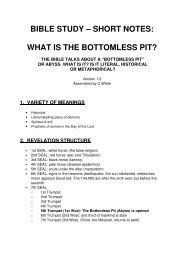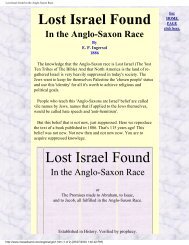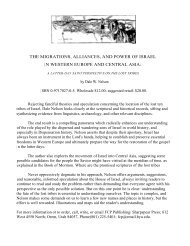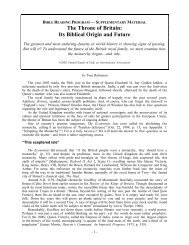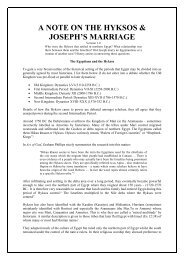HISTORY OF THE SABBATH - Friends of the Sabbath Australia
HISTORY OF THE SABBATH - Friends of the Sabbath Australia
HISTORY OF THE SABBATH - Friends of the Sabbath Australia
Create successful ePaper yourself
Turn your PDF publications into a flip-book with our unique Google optimized e-Paper software.
History <strong>of</strong> <strong>the</strong> <strong>Sabbath</strong> by J.N Andrews"Mrs. Trask lay fifteen or sixteen years a prisoner for her opinion about <strong>the</strong> Saturday <strong>Sabbath</strong>;in all which time she would receive no relief from anybody, notwithstanding she wantedmuch: alleging that it was written, `It is more blessed . . . to give than to receive.' Nei<strong>the</strong>rwould she borrow, because it was written, `Thou shalt lend to many nations, and shall notborrow.' So she deemed it a dishonor to her head, Christ, ei<strong>the</strong>r to beg or borrow. Her diet for<strong>the</strong> most part during her imprisonment, that is, till a little before her death, was bread andwater, roots and herbs; no flesh, nor wine, nor brewed drink. All her means was an annuity <strong>of</strong>forty shillings a year; what she lacked more to live upon she had <strong>of</strong> such prisoners as didemploy her sometimes to do business for <strong>the</strong>m." 11Pagitt, who was <strong>the</strong> contemporary <strong>of</strong> Trask, thus states <strong>the</strong> principles <strong>of</strong> <strong>the</strong> Sabbatarians <strong>of</strong>that time, whom he calls Traskites:"The positions concerning <strong>the</strong> <strong>Sabbath</strong> by <strong>the</strong>m maintained were <strong>the</strong>se:"1. That <strong>the</strong> fourth commandment <strong>of</strong> <strong>the</strong> Decalogue, `Remember <strong>the</strong> <strong>Sabbath</strong> day, to keep itholy' [Ex. 20], is a divine precept, simply and entirely moral, containing nothing legallyceremonial in whole or in part, and <strong>the</strong>refore <strong>the</strong> weekly observation <strong>the</strong>re<strong>of</strong> ought to beperpetual, and to continue in force and virtue to <strong>the</strong> world's end."2. That <strong>the</strong> Saturday, or seventh day in every week, ought to be an everlasting holy day in <strong>the</strong>Christian church, and <strong>the</strong> religious observation <strong>of</strong> this day obligeth Christians under <strong>the</strong>gospel, as it did <strong>the</strong> Jews before <strong>the</strong> coming <strong>of</strong> Christ.3. That <strong>the</strong> Sunday, or Lord's day, is an ordinary working day, and it is superstition and willworshipto make <strong>the</strong> same <strong>the</strong> <strong>Sabbath</strong> <strong>of</strong> <strong>the</strong> fourth commandment." 12It was for this noble confession <strong>of</strong> faith that Mrs. Trask was shut up in prison till <strong>the</strong> day <strong>of</strong>her death. For <strong>the</strong> same, Mr. Trask was compelled to stand in <strong>the</strong> pillory, and was whippedfrom <strong>the</strong>nce to <strong>the</strong> fleet, and <strong>the</strong>n shut up in a wretched prison, from which he escaped byrecantation after enduring <strong>the</strong> miseries <strong>of</strong> more than a year. 13Mr. Utter mentions <strong>the</strong> next Sabbatarian minister as follows:"Theophilus Brabourne, a learned minister <strong>of</strong> <strong>the</strong> gospel in <strong>the</strong> established church, wrote abook, which was printed at London in 1628, wherein he argued `that <strong>the</strong> Lord's day is not <strong>the</strong><strong>Sabbath</strong> day by divine institution,' but `that <strong>the</strong> seventh-day <strong>Sabbath</strong> is now in force.' Mr.Brabourne published ano<strong>the</strong>r book in 1632, entitled, `A Defense <strong>of</strong> that most Ancient andSacred Ordinance <strong>of</strong> God's, <strong>the</strong> <strong>Sabbath</strong> Day.'" 14Brabourne dedicated his book to King Charles I., requesting him to use his royal authority for<strong>the</strong> restoration <strong>of</strong> <strong>the</strong> ancient <strong>Sabbath</strong>. But those who put <strong>the</strong>ir trust in princes are sure to bedisappointed. Dr. F. White, bishop <strong>of</strong> Ely, thus states <strong>the</strong> occasion <strong>of</strong> his own work against <strong>the</strong><strong>Sabbath</strong>:"Now because this Brabourne's treatise <strong>of</strong> <strong>the</strong> <strong>Sabbath</strong> was dedicated to his Royal Majesty,and <strong>the</strong> principles upon which he grounded all his arguments (being commonly preached,printed, and believed throughout <strong>the</strong> kingdom), might have poisoned and infected manypeople ei<strong>the</strong>r with this Sabbatarian error, or with some o<strong>the</strong>r <strong>of</strong> like quality; it was <strong>the</strong> king,our gracious master, his will and pleasure, that a treatise should be set forth, to prevent fur<strong>the</strong>rmischief, and to settle his good subjects (who have long time been distracted aboutSabbatarian questions) in <strong>the</strong> old and good way <strong>of</strong> <strong>the</strong> ancient and orthodoxal Catholic282


